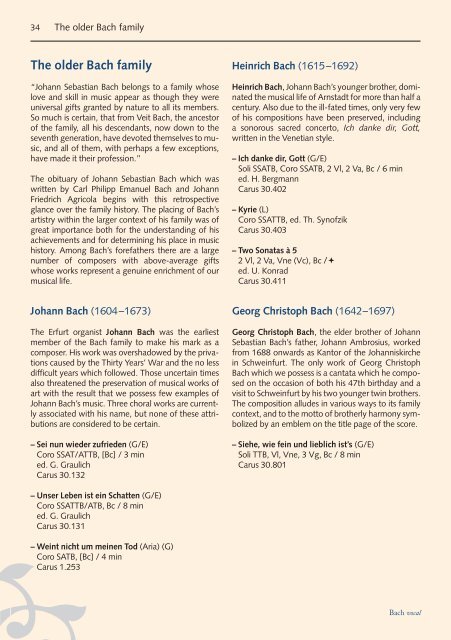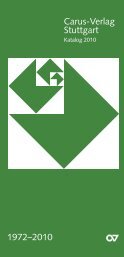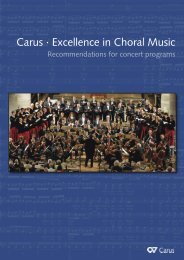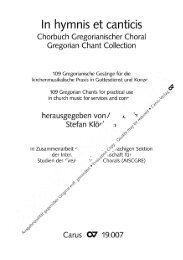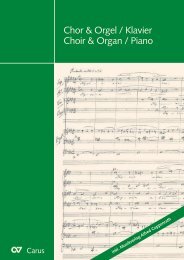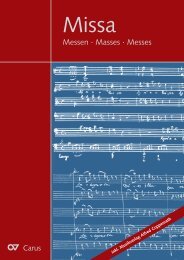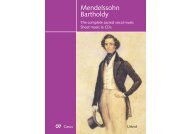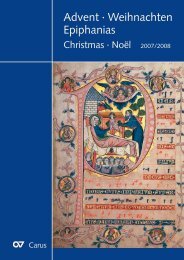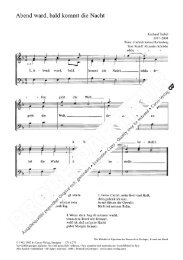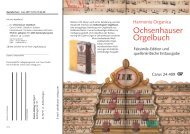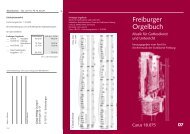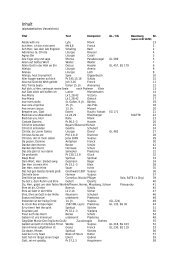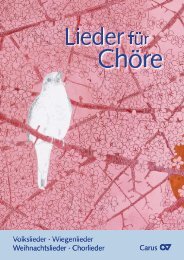Cantatas · Masses · Oratorios Passions · Motets
Cantatas · Masses · Oratorios Passions · Motets
Cantatas · Masses · Oratorios Passions · Motets
You also want an ePaper? Increase the reach of your titles
YUMPU automatically turns print PDFs into web optimized ePapers that Google loves.
34 The older Bach family<br />
The older Bach family<br />
“Johann Sebastian Bach belongs to a family whose<br />
love and skill in music appear as though they were<br />
universal gifts granted by nature to all its members.<br />
So much is certain, that from Veit Bach, the ancestor<br />
of the family, all his descendants, now down to the<br />
seventh generation, have devoted themselves to music,<br />
and all of them, with perhaps a few exceptions,<br />
have made it their profession.”<br />
The obituary of Johann Sebastian Bach which was<br />
written by Carl Philipp Emanuel Bach and Johann<br />
Friedrich Agricola begins with this retrospective<br />
glance over the family history. The placing of Bach’s<br />
artistry within the larger context of his family was of<br />
great importance both for the understanding of his<br />
achievements and for determining his place in music<br />
history. Among Bach’s forefathers there are a large<br />
number of composers with above-average gifts<br />
whose works represent a genuine enrichment of our<br />
musical life.<br />
Johann Bach (1604–1673)<br />
The Erfurt organist Johann Bach was the earliest<br />
member of the Bach fam ily to make his mark as a<br />
composer. His work was overshadowed by the privations<br />
caused by the Thirty Years’ War and the no less<br />
difficult years which followed. Those uncertain times<br />
also threatened the preserva tion of musical works of<br />
art with the result that we possess few examples of<br />
Johann Bach’s music. Three choral works are currently<br />
associated with his name, but none of these attributions<br />
are considered to be certain.<br />
– Sei nun wieder zufrieden (G/E)<br />
Coro SSAT/ATTB, [Bc] / 3 min<br />
ed. G. Graulich<br />
Carus 30.132<br />
– Unser Leben ist ein Schatten (G/E)<br />
Coro SSATTB/ATB, Bc / 8 min<br />
ed. G. Graulich<br />
Carus 30.131<br />
– Weint nicht um meinen Tod (Aria) (G)<br />
Coro SATB, [Bc] / 4 min<br />
Carus 1.253<br />
Heinrich Bach (1615–1692)<br />
Heinrich Bach, Johann Bach’s younger brother, dominated<br />
the musical life of Arnstadt for more than half a<br />
century. Also due to the ill-fated times, only very few<br />
of his compositions have been preserved, including<br />
a sonorous sacred concerto, Ich danke dir, Gott,<br />
written in the Venetian style.<br />
– Ich danke dir, Gott (G/E)<br />
Soli SSATB, Coro SSATB, 2 Vl, 2 Va, Bc / 6 min<br />
ed. H. Bergmann<br />
Carus 30.402<br />
– Kyrie (L)<br />
Coro SSATTB, ed. Th. Synofzik<br />
Carus 30.403<br />
– Two Sonatas à 5<br />
2 Vl, 2 Va, Vne (Vc), Bc /�<br />
ed. U. Konrad<br />
Carus 30.411<br />
Georg Christoph Bach (1642–1697)<br />
Georg Christoph Bach, the elder brother of Johann<br />
Sebastian Bach’s father, Johann Ambrosius, worked<br />
from 1688 onwards as Kantor of the Johanniskirche<br />
in Schweinfurt. The only work of Georg Christoph<br />
Bach which we possess is a cantata which he composed<br />
on the occasion of both his 47th birthday and a<br />
visit to Schweinfurt by his two younger twin brothers.<br />
The composition alludes in various ways to its family<br />
context, and to the motto of brotherly harmony symbolized<br />
by an emblem on the title page of the score.<br />
– Siehe, wie fein und lieblich ist’s (G/E)<br />
Soli TTB, Vl, Vne, 3 Vg, Bc / 8 min<br />
Carus 30.801<br />
Bach vocal


